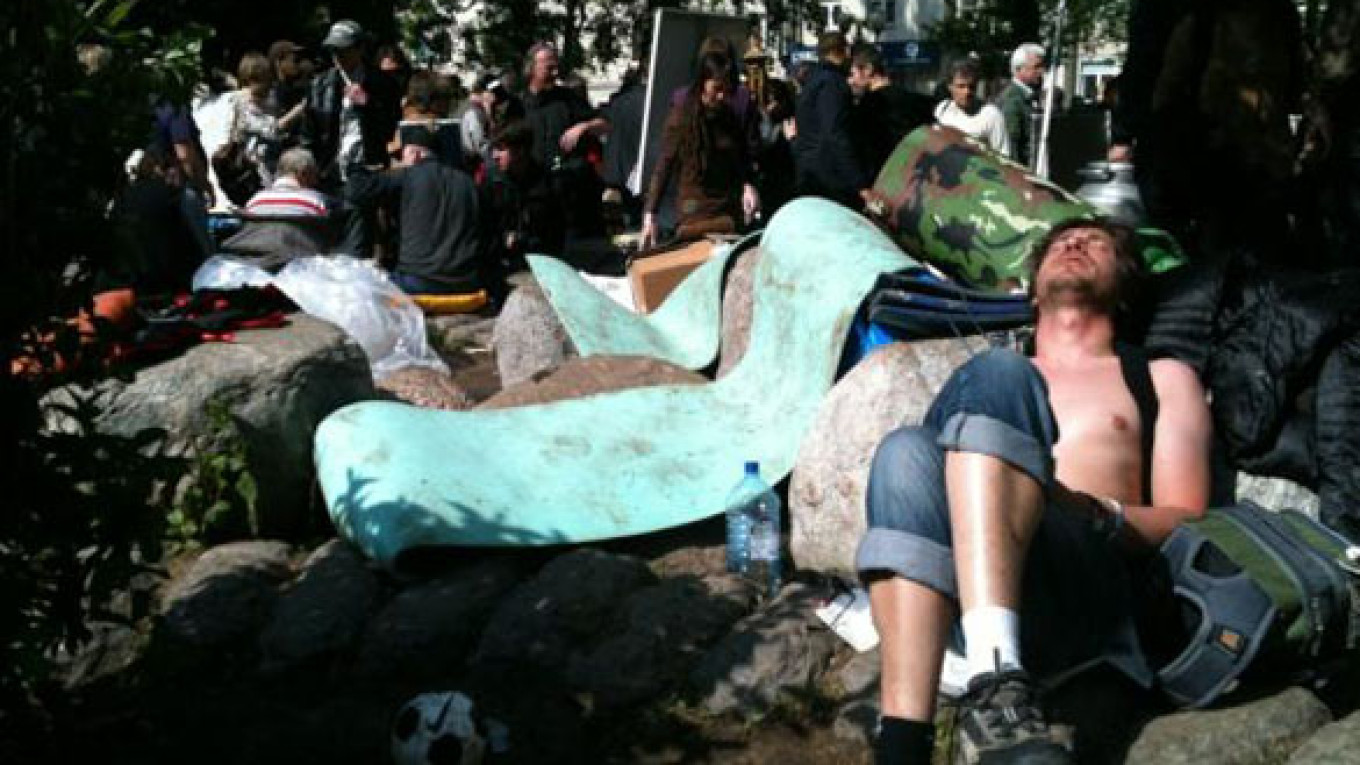Responding to local residents’ complaints of filth and an unsafe environment for children, a Moscow court ordered police to do something about a protesters’ camp in a Chistiye Prudy park on Tuesday.
While the Basmanny District Court ruling stopped short of demanding a crackdown, it did say city authorities were guilty of inactivity, meaning that the police were all but certain to dismantle the camp within hours.
The camp, whose numbers range from several dozen during the night to hundreds during the evenings, has been the nexus of opposition to President Vladimir Putin's inauguration since last Wednesday.
Tuesday’s announcement threw opposition activists into disarray, with some continuing with what has become their new routine — holding lectures, serving food and providing security — while others called an emergency “assembly” to determine a response.
Surrounded by scores of journalists, a handful of activists voted unanimously to remain at the campsite and passively resist what they expected would be battalions of riot police. There was no consensus as of Tuesday evening on where to go next, with one opposition leader, Ilya Ponomaryov, proposing the statue of Karl Marx that faces the Bolshoi Theater on Teatralyana Ploshchad.
They were joined at first by an unwelcome guest in the form of Yelena Goncharova, 49, who said she was a local resident and complained that the camp was ruining her neighborhood. “This is an anthill!” she said. “Go back to your neighborhoods. Do something else.”
The court's decision came as a surprise for some activists, who had taken heart after a senior City Hall official said Monday that he hadn't heard of any plans to clear the camp.
But others, like socialite and opposition supporter Ksenia Sobchak appeared to have seen it coming. On Monday, Sobchak tweeted a text message, purportedly from a City Hall source, that read: “You can tell Ksyusha [Sobchak] that in an hour there will be a staged interview with local residents angry about the disorder on Chistiye Prudy. Then there will be a show trial, and tomorrow they'll clear the boulevard.”
City Hall has received about 50 complaints from local residents, RIA-Novosti reported Tuesday. An official complaint was filed with the Basmanny court on Monday.
Residents said the camp was a hazard that made it unsafe to send children out and a nuisance that resulted in insulting graffiti appearing on neighboring buildings.
In addition to residents' complaints, a city official told the court on Tuesday that protesters had inflicted about 20.4 million rubles ($671,000) in damage to the lawns in the park.
Activists say the camp is not only legal, but sanitary and tidy. Inhabitants have made cleanliness a major priority, and the grounds were generally clear of litter and filth.
But it was difficult not to notice a strong stench that emanated from portable toilets in the park, which were removed on City Hall orders on Monday, and the campers appeared to have varying standards of personal hygiene.
Another opposition leader, Ilya Yashin, said the complaints were in fact an attempt by the authorities to clear the camp. “I have no doubt that the court is being used to kick us out. The authorities understand the pointlessness of muscling us out, so they'll try to squeeze us out by other means,” he said, Interfax reported.
Life at Chistiye Prudy went on as usual Tuesday evening as protesters waited for the police to appear. About a dozen people listened to a man with a thick gray beard deliver a lecture on bird songs. Three teenage girls with matching dyed red hair sat by the park’s pond, listening to one of them play a recorder.
“No more obedience! No more fear!” a young man told the emergency assembly near a statue of Kazakh poet Abai Qunanbayuli, while skinheads with nationalist wristbands bustled around, muttering into walkie-talkies, and volunteers made bologna sandwiches and handed out plastic cups of bargain-basement pineapple juice.
“I don't understand what they want. It just looks like a hangout,” said Svetlana, a local resident who said she was visiting the camp for the first time. She said she didn't feel safe at the camp, but added that the crowd wasn't any scarier than the musicians and suspect types who used to gather there.
Police detained four people at a separate, smaller camp on Nikitsky Bulvar to check their documents and warn them against breaking the law, Interfax reported. It was unclear late Tuesday whether the camp, protesting the extended detention of the feminist punk band Pussy Riot, still existed.
The government also took steps on Tuesday to prevent a repeat of a May 6 rally against Putin's inauguration that ended in violence and hundreds of detentions, reinvigorating the opposition movement. United Russia deputies introduced a in the State Duma calling for people who participated in the violence to be punished.
“I think that by the time June demonstrations come around, there will be different fines for breaking the law,” Alexander Sidyakin, a United Russia deputy who has proposed a significant hike in fines for unsanctioned demonstrations, tweeted on Tuesday. “Get the cash ready, oppositionists.”
The opposition is planning a large rally for the Russia Day holiday on June 12.
After thousands of opposition activists marched alongside some of Russia's most popular writers to support freedom of assembly last Sunday, a group of 25 Moscow artists have announced a nonpolitical stroll of their own to correspond to Saturday's citywide Night at the Museum festival.
The Nomadic Museum, which will feature the artists pushing and pulling their works through central Moscow, will begin at 6 p.m.
The Night at the Museum is an annual event in which city museums open all night for special tours, performances, concerts and master classes.


